|
|
|
Sort Order |
|
|
|
Items / Page
|
|
|
|
|
|
|
| Srl | Item |
| 1 |
ID:
147595
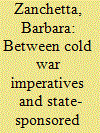

|
|
|
|
|
| Summary/Abstract |
Operation Condor was a transnational network of organized state-sponsored terrorism that targeted Communist “subversion.” It was operational in the second half of the 1970s. The key member countries were Chile, Argentina, Uruguay, Bolivia, Paraguay, and Brazil (Peru and Equador joined the network later on, with a more marginal role). Based on declassified documents from the United Nations High Commissioner for Refugees in Geneva and on U.S. documents of various origin, this article will assess the development of the Condor network and the U.S. reaction to such manifest acts of state-sponsored terrorism.
|
|
|
|
|
|
|
|
|
|
|
|
|
|
|
|
| 2 |
ID:
171053
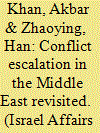

|
|
|
|
|
| Summary/Abstract |
This article argues that state sponsorship of terrorism is a by-product of conflicting relations between states that are generally hostile towards each other. States harbour and drive non-state actors, aiming to create security concerns to the target states, which provoke the target states to take retaliatory actions against the host and/or the terrorist group in a bid to avoid destabilization, uncertainty, and a possible shift in the balance of power between the sponsoring and target state. At this juncture, state sponsorship of terrorism contributes to escalating the conflict. Hence, this type of terrorism should not be treated as a distinct form of violence but as a corollary of interstate rivalries. Iran’s sponsorship of Hezbollah and the Houthis against the backdrop of its rivalry with Israel and Saudi Arabia offers a vivid demonstration of this escalatory dynamic.
|
|
|
|
|
|
|
|
|
|
|
|
|
|
|
|
| 3 |
ID:
093693
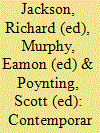

|
|
|
|
|
| Publication |
London, Routledge, 2010.
|
| Description |
xiv, 242 p.
|
| Series |
Critical terrorism studies
|
| Standard Number |
9780415498012
|
|
|
|
|
|
|
|
|
|
|
|
Copies: C:1/I:0,R:0,Q:0
Circulation
| Accession# | Call# | Current Location | Status | Policy | Location |
| 054839 | 327.117/JAC 054839 | Main | On Shelf | General | |
|
|
|
|
| 4 |
ID:
187058
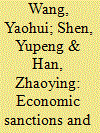

|
|
|
|
|
| Summary/Abstract |
While economic sanctions are often used as a foreign policy tool to fight state-sponsored terrorism, their efficacy remains unclear. This article argues that the intensifying economic hardship caused by sanctions forces the targeted governments to undertake a retrenchment strategy, which in turn reduces the overall frequency of state-sponsored terrorist attacks. Using cross-sectional-time-series data of Iranian-backed terrorism from 1987 to 2005, the article shows that sanctions against the Iranian regime were instrumental in reducing terrorist attacks by Hamas, Hezbollah, and the Palestinian Islamic Jihad (PIJ).
|
|
|
|
|
|
|
|
|
|
|
|
|
|
|
|
| 5 |
ID:
075075
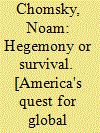

|
|
|
|
|
| Publication |
Cross Nest, Allen & unwin, 2007.
|
| Description |
300p.
|
| Standard Number |
1741145007
|
|
|
|
|
|
|
|
|
|
|
|
Copies: C:1/I:0,R:0,Q:0
Circulation
| Accession# | Call# | Current Location | Status | Policy | Location |
| 051915 | 327.730090511/CHO 051915 | Main | On Shelf | General | |
|
|
|
|
| 6 |
ID:
054239
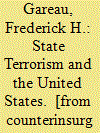

|
|
|
|
|
| Publication |
Atlanta, Clarity Press Inc., 2004.
|
| Description |
254p.
|
| Standard Number |
1842775359
|
|
|
|
|
|
|
|
|
|
|
|
Copies: C:1/I:0,R:0,Q:0
Circulation
| Accession# | Call# | Current Location | Status | Policy | Location |
| 048749 | 303.625/GAR 048749 | Main | On Shelf | General | |
|
|
|
|
| 7 |
ID:
182462
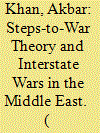

|
|
|
|
|
| Summary/Abstract |
I employ Steps-to-War theory to analyze interstate wars in the Middle East by adding an additional escalating step: state sponsorship of non-state actors. Remarkably, however, the present scholarship completely overlooks a comprehensive assessment of the impacts and roles of state-sponsored terrorism on escalation of interstate militarized conflicts. None of the conflict studies focuses on state-sponsored terrorism and escalation of interstate conflict. This gap still exists despite a remarkable growth in the conflict literature. This article argues that the Steps-to-War thesis is a useful framework for understanding why states end up fighting wars by answering the questions: How does state-sponsored terrorism escalate interstate conflict? And how does each step intertwine with other steps and make war more likely? This paper’s primary argument is that state-sponsored terrorism increases the likelihood of war by providing another escalating step in conjunction with other steps and, therefore, aligns with Steps-to-War theory, and is one of the leading escalating factors. Ultimately, this article argues that this claim has a solid basis, and the Middle Eastern cases vividly demonstrate the escalatory ability of state-sponsored terrorism because state-sponsored terrorism interacts with and reinforces other escalating factors.
|
|
|
|
|
|
|
|
|
|
|
|
|
|
|
|
|
|
|
|
|